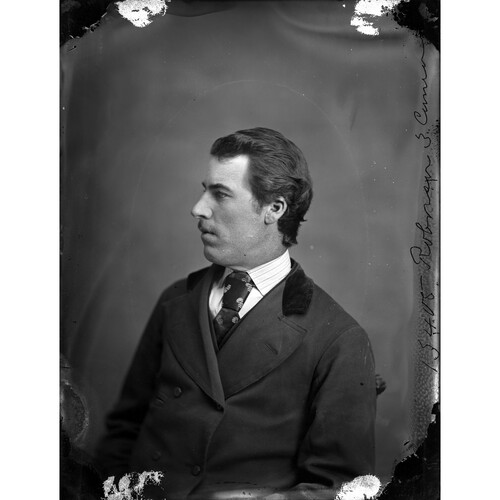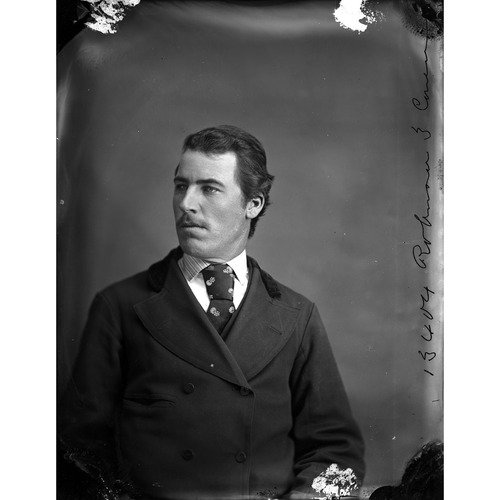ROBINSON, JOSEPH HIRAM, Methodist minister and editor; b. 20 Dec. 1807 in Mossley (Greater Manchester), England, son of John Robinson and Sarah —; m. 1833 Jane Scholey; d. 13 April 1896 in Ottawa.
Joseph Hiram Robinson, subject to strong religious influence from his mother, joined the Methodist New Connexion Church in 1822. He was licensed as a local preacher in 1826 and four years later he was received as a probationer minister. Following brief appointments in various locations he was ordained in 1835. After serving for 16 years such important circuits as Liverpool, Chester, and Sheffield, Robinson was appointed in 1851 to succeed Dr Henry O. Crofts as superintendent of the Canadian Wesleyan Methodist New Connexion Church, established ten years previously.
Robinson served as superintendent of the New Connexion missions for 15 years, and he was elected president of conference in 1852, 1856, 1861, 1865, and 1869. As superintendent, he did not serve as a minister, but he visited circuits, consulted with and counselled ministers, provided liaison between the mother church and the Canadian body, and encouraged the raising of funds. During this period he was also involved in the temperance movement, and he was one of the chief organizers of the British American Order of Good Templars, serving for several years as president.
Recognizing the need for a journal to promote the work of his denomination, Robinson founded the Evangelical Witness in 1854 in London, Upper Canada, his principal residence from 1856. Robinson served as editor of the monthly, and later bi-monthly, publication from 1854, although he was officially appointed only in 1858. He invested several thousand dollars of his own money in the Witness, but the publication continued to lose money, even with the aid of the English conference. In 1866 he resigned as superintendent of missions and editor of the Witness to become book steward and treasurer. Robinson was recalled by the English conference in 1870 and was appointed editor of the Methodist New Connexion Magazine and Evangelical Repository (Manchester) and manager of the Connexional Publishing House in London. While so engaged he was elected in 1872 president of the English conference.
During its years in Canada the New Connexion Church had been unable to make much headway against the dominant bodies in Canadian Methodism, the Wesleyan Methodists and the Methodist Episcopals, and it remained small and scattered, its mission understaffed and financially troubled. In 1873, therefore, the Canadian New Connexion conference approved a plan of union with the Canadian Wesleyan Methodist Church. The English New Connexion conference, which opposed any union, returned Robinson to Toronto to assist the Reverend Henry Medicraft, his successor, in the discussions. He was also instructed to arrange pastoral care for the considerable minority of members who the English conference believed were opposed to union. However, at the New Connexion conference of 1874 the final vote on union saw only 18 of the approximately 125 laymen and ministers who attended opposed. Robinson consequently advised the representatives that it would be unseemly and hopeless to try to continue as a separate denomination at the expense of the English mission fund. When the English conference learned of the overwhelming support for union it consented to the measure, which was consummated in 1874.
His mission completed, Robinson decided to spend his retirement in Canada, where several of his family had settled. In 1875 he was received into the ministry of the Methodist Church of Canada by its London conference. For 15 years, though officially retired, he served as an assistant to the ministers at Dundas Street Centre Methodist Church in London. In 1890 Robinson and his wife made their home with a daughter and son-in-law in Ottawa. Mrs Robinson died that year, followed by her husband in 1896. As well as their daughter in Ottawa, the Robinsons were survived by two other daughters and a son.
Joseph Hiram Robinson was perhaps the ablest of all the superintendents of the Wesleyan Methodist New Connexion missions. In the judgement of Methodist historian William Williams, “No man ever did more to make the Canadian Connexion a success than he did.” He employed great skill in handling the financial problems of the connexion. To quote Williams again, “His ready wit, massive facts, and skill in using every passing incident for the promotion of his purpose gave him great ascendancy in the Conference and throughout the Connexion.”
School of Oriental and African Studies Library, Univ. of London, Methodist Missionary Soc. Arch., Methodist New Connexion Church, Foreign and Colonial Missions Committee, letters from missionaries in Canada (mfm. at UCC-C). UCC-C, Albert Burnside, “The Canadian Wesleyan Methodist New Connexion Church, 1841–1874” (typescript report, Emmanuel College, Victoria Univ., Toronto, 1967); Dundas Street Methodist Church (London, Ont.), minutes of the quarterly meetings, 15 Nov. 1875. Evangelical Witness (London), 1 (1854)–21 (1874). Methodist Church (Canada, Newfoundland, Bermuda), General Conference, Centennial of Canadian Methodism (Toronto, 1891), 112; London Conference, Minutes, 2 (1892–98), minutes for 1896: 8. Christian Guardian, 10 Sept. 1870, 3 June 1896. Cornish, Cyclopædia of Methodism. United Methodist ministers and their circuits . . . 1797–1932, comp. O. A. Beckerlegge (London, Eng., 1968).
Cite This Article
Albert Burnside, “ROBINSON, JOSEPH HIRAM,” in Dictionary of Canadian Biography, vol. 12, University of Toronto/Université Laval, 2003–, accessed April 27, 2025, https://www.biographi.ca/en/bio/robinson_joseph_hiram_12E.html.
The citation above shows the format for footnotes and endnotes according to the Chicago manual of style (16th edition). Information to be used in other citation formats:
| Permalink: | https://www.biographi.ca/en/bio/robinson_joseph_hiram_12E.html |
| Author of Article: | Albert Burnside |
| Title of Article: | ROBINSON, JOSEPH HIRAM |
| Publication Name: | Dictionary of Canadian Biography, vol. 12 |
| Publisher: | University of Toronto/Université Laval |
| Year of revision: | 1990 |
| Access Date: | April 27, 2025 |




